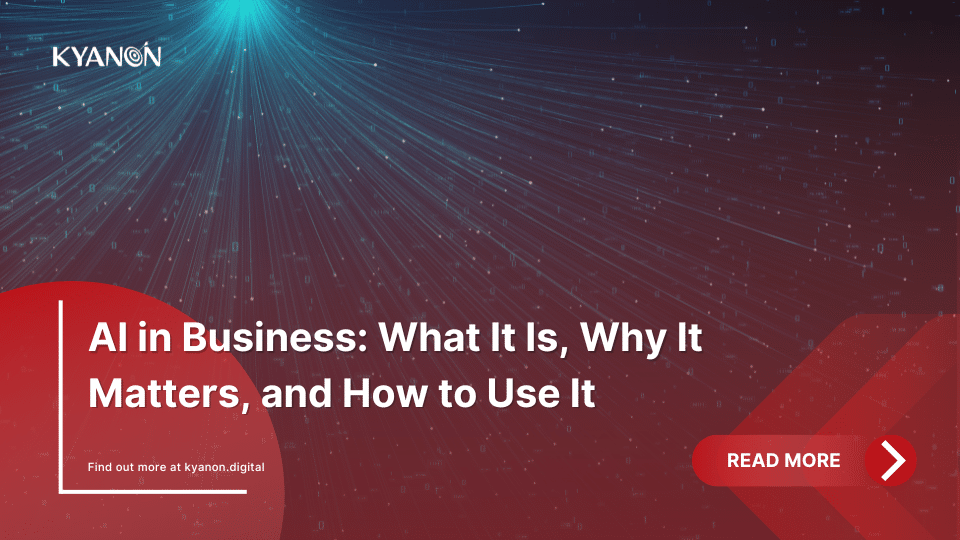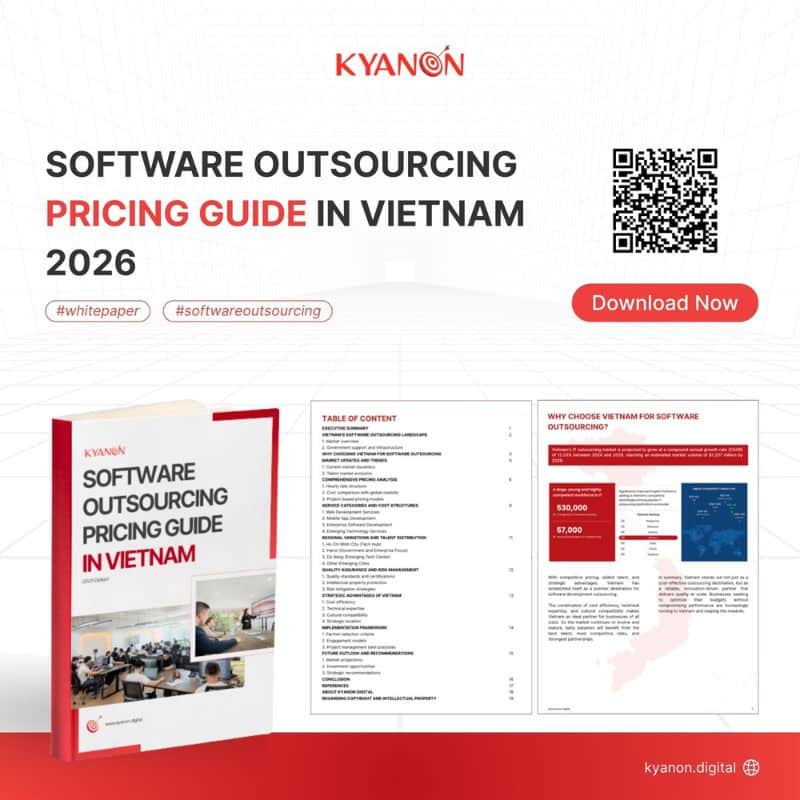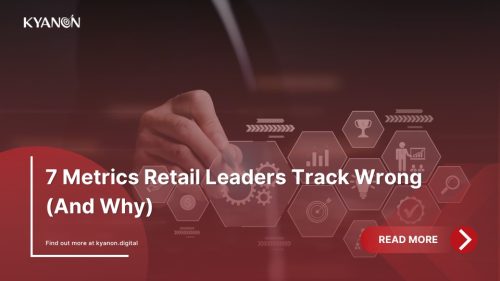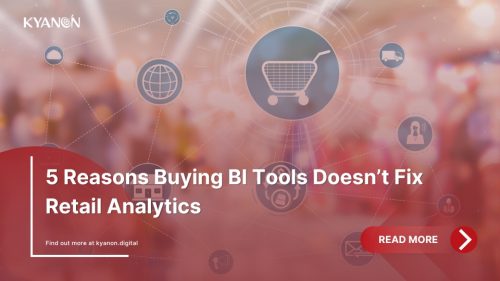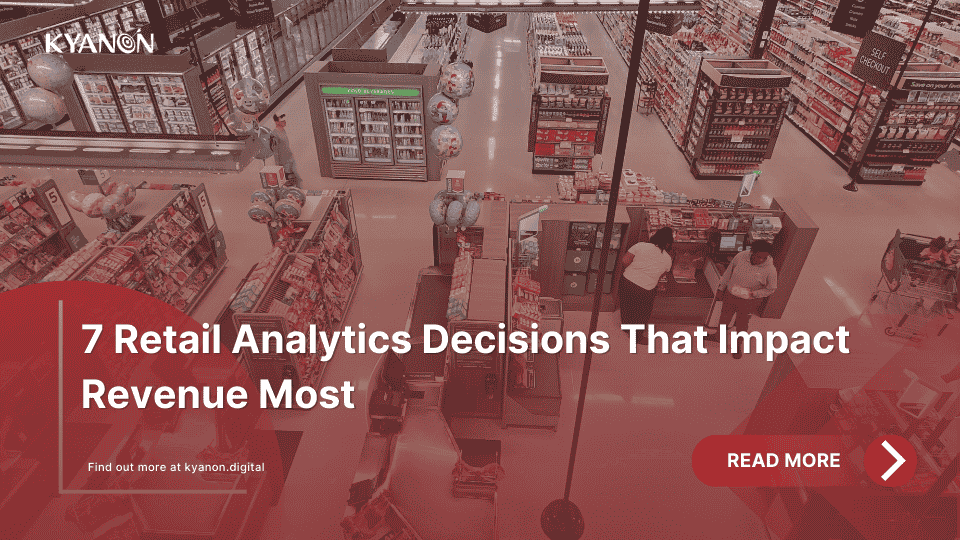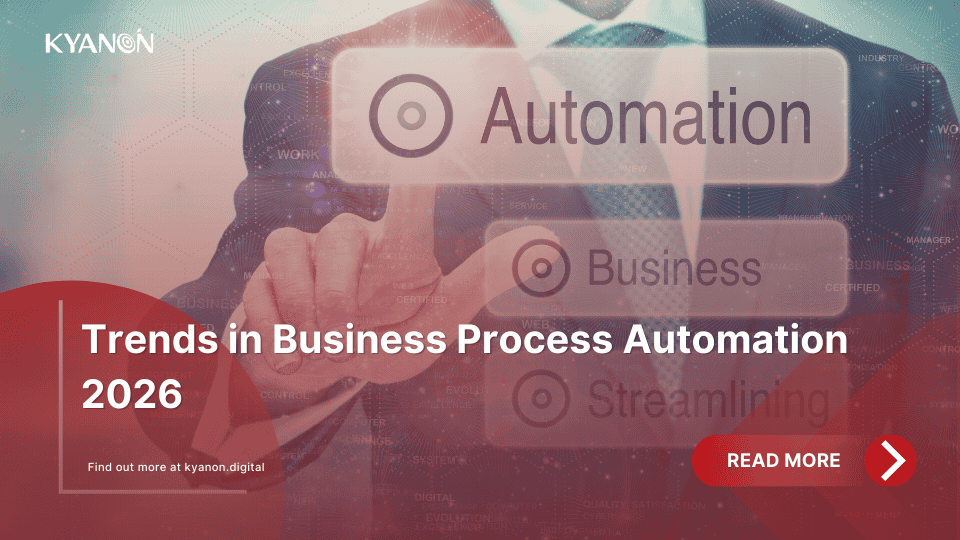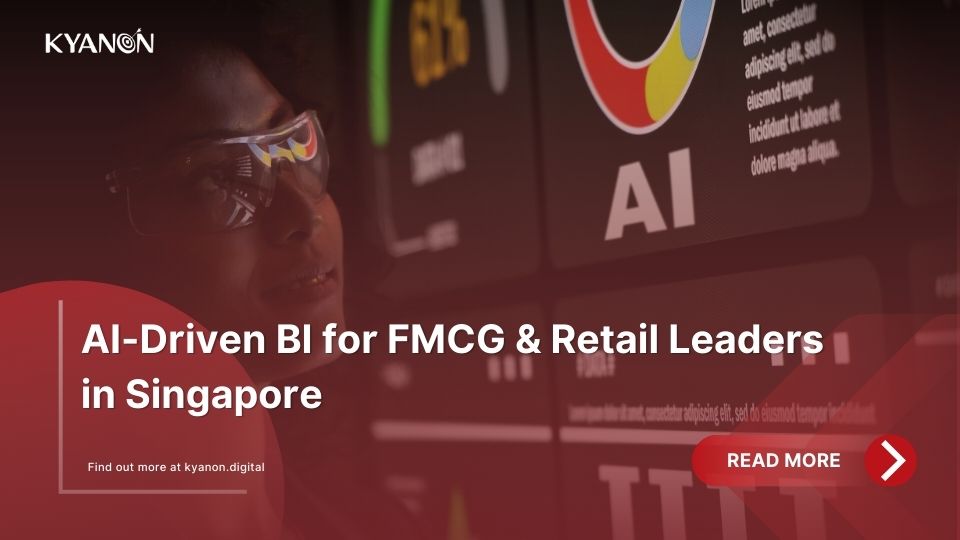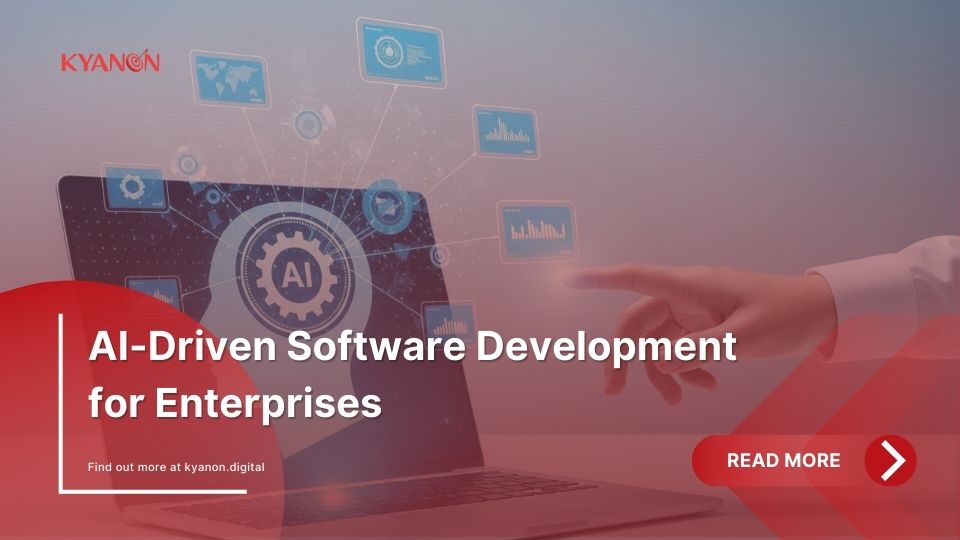Step into any boardroom or startup incubator today, and one acronym inevitably dominates the conversation: AI. Artificial Intelligence, once a concept confined to science fiction, has rapidly evolved from theoretical possibility to practical imperative. We’re no longer just talking about intelligent machines; we’re witnessing them reshape the very fabric of how businesses operate, innovate, and compete. This isn’t just another technological upgrade; it’s a fundamental shift, a new era where the use of AI in business is no longer a luxury but a strategic necessity.
Key Takeaways on the Use of AI in Business
- AI is a strategic imperative, not a luxury, for modern business: The use of AI in business has become fundamental, with 78% of companies using AI in at least one function by 2024. AI accelerates innovation, provides deeper insights into data, and optimizes resource allocation, enabling businesses to gain a significant competitive edge and drive digital transformation. It’s crucial for enhancing efficiency, increasing agility, and meeting evolving customer expectations.
- AI delivers tangible business benefits across all functions: Artificial intelligence in business examples showcase a wide range of practical applications. AI significantly reduces operational costs (up to 30% for full adoption), improves decision-making through advanced data analysis, and enhances customer experience via personalization and 24/7 support. It also boosts efficiency and productivity by automating tasks, freeing up human employees for higher-value activities, and unlocks new innovation and revenue streams.
- AI’s impact spans across diverse industries: While AI in business offers advantages universally, it’s particularly transformative for data-intensive sectors. Industries like manufacturing, retail, financial services, healthcare, telecommunications, transportation, marketing, and customer service are seeing immense benefits from AI automation in areas such as predictive maintenance, personalized recommendations, fraud detection, drug discovery, and supply chain optimization.
- A structured approach is key to successful AI adoption: To effectively start using AI in business, begin by defining a specific business problem, not just focusing on the technology. Assess your data readiness, start small with pilot projects, and consider AI-as-a-Service (AIaaS) solutions for faster, cost-effective deployment, especially for SMEs. Remember to foster collaboration between humans and AI, and continuously measure and iterate on your AI initiatives for long-term performance.
- AI augments, not replaces, human capabilities: While AI automates many routine tasks, its primary role in the business context is to augment human intelligence. It frees up employees to focus on more strategic, creative, and empathetic work. Successful AI and business integration involves reskilling the workforce and designing AI solutions that empower people, ensuring that AI becomes a powerful tool that enhances, rather than diminishes, human roles.
Further reading:
- How to choose the right AI consulting service partner for your business
- AI in Ecommerce and Retail: Trends, Use Cases, and Business Impact
- AI in Banking and Financial Services: Trends, Use Cases & Market Impact
The pace of AI adoption is accelerating rapidly. Gartner forecasts that worldwide spending on generative AI will reach $644 billion in 2025, a 76.4% increase from 2024. This surge is driven largely by AI integration into hardware like servers, smartphones, and PCs, which will account for 80% of total GenAI investment. Such growth highlights AI’s expanding role as a core technology transforming business operations and consumer products globally.
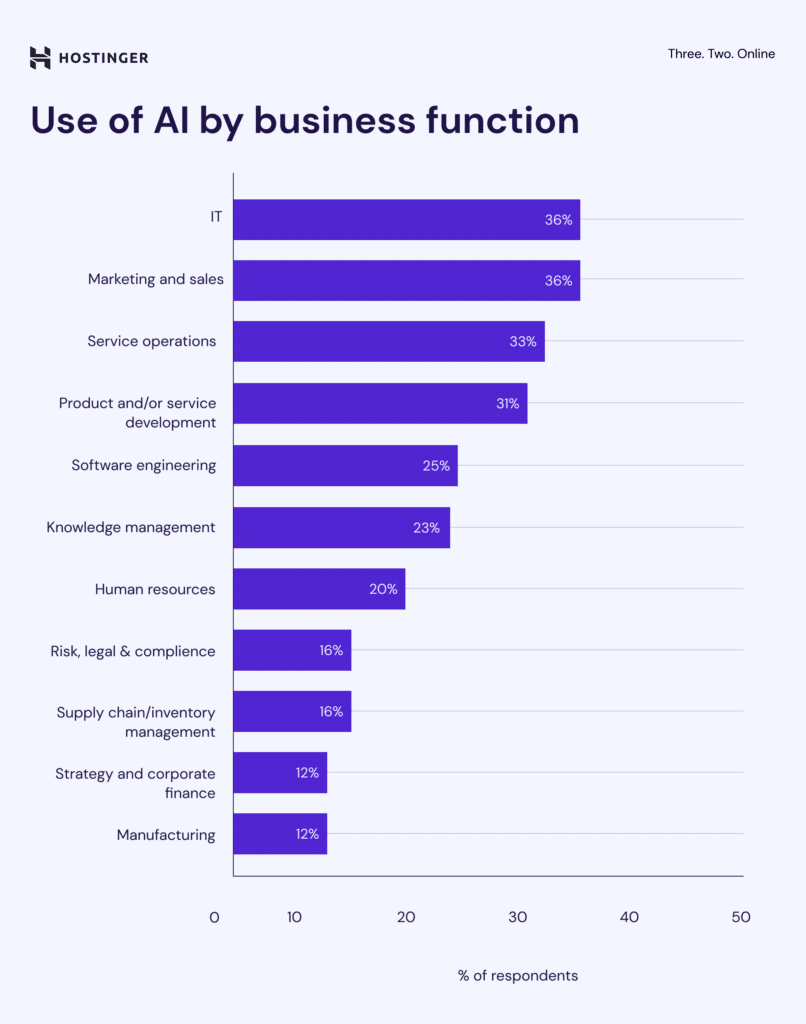
The global AI market itself is experiencing exponential growth, valued at approximately $391 billion in 2025 and projected to reach $1.81 trillion by 2030. This widespread integration underscores why AI is a game-changer for businesses of all sizes. From automating mundane tasks to uncovering hidden insights in vast datasets, AI is proving to be the engine driving efficiency, powering personalization, and unlocking unprecedented opportunities for growth. If you’re wondering how AI can transform your enterprise, or where to even begin, you’ve come to the right place. This article will demystify AI and business, exploring its core benefits, practical applications, and a clear roadmap for integrating it into your operations.
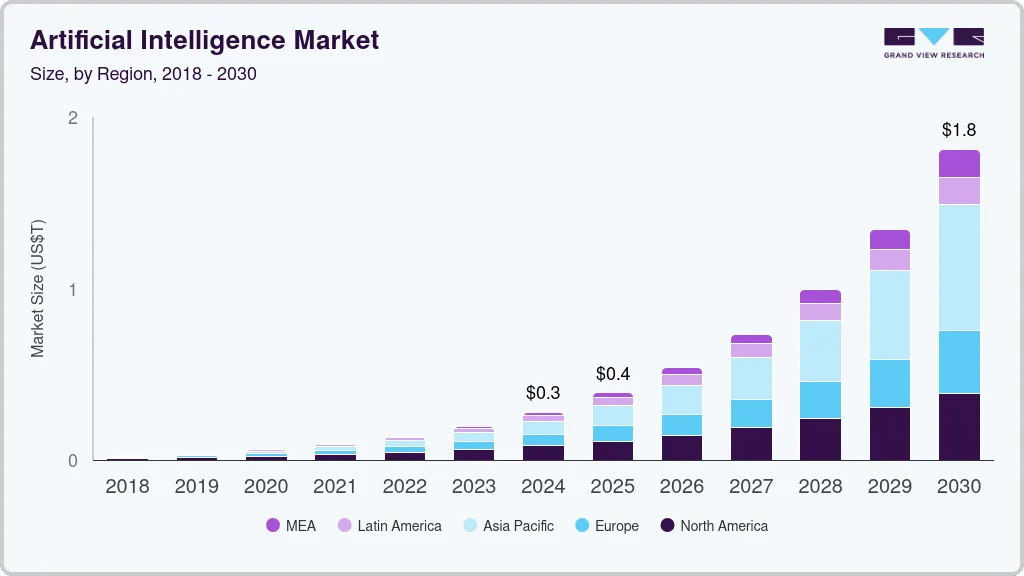
Why Is AI Important in Business?
In today’s hyper-competitive landscape, staying ahead means continuously innovating and adapting. This is precisely where AI in business demonstrates its profound strategic value. It’s not merely about automating tasks; it’s about empowering organizations to make smarter decisions, operate with greater agility, and deliver exceptional customer experiences.
The Strategic Value of AI for Innovation and Competitiveness
AI provides a powerful competitive edge by enabling businesses to:
- Accelerate Innovation: AI tools can rapidly analyze market trends, predict consumer behavior, and even generate new product ideas, significantly shortening innovation cycles. For instance, reports from 2025 indicate that over 40% of business leaders report increased productivity through AI automation, directly impacting their ability to innovate faster (Hostinger).
- Gain Deeper Insights: Traditional data analysis methods often fall short when dealing with the sheer volume and complexity of modern data. AI, particularly machine learning, excels at identifying patterns, correlations, and anomalies that human analysts might miss, providing a richer understanding of customers, markets, and operational inefficiencies. In fact, 92.1% of businesses have seen measurable results from AI adoption, underscoring its effectiveness in delivering actionable intelligence (The Social Shepherd).
- Optimize Resource Allocation: By predicting demand, optimizing supply chains, and streamlining internal processes, AI ensures that resources-be it human capital, inventory, or financial assets-are utilized with maximum efficiency. Studies reveal that operational efficiency is the top AI benefit for 29% of business leaders (Hostinger), emphasizing its role in smart resource management.
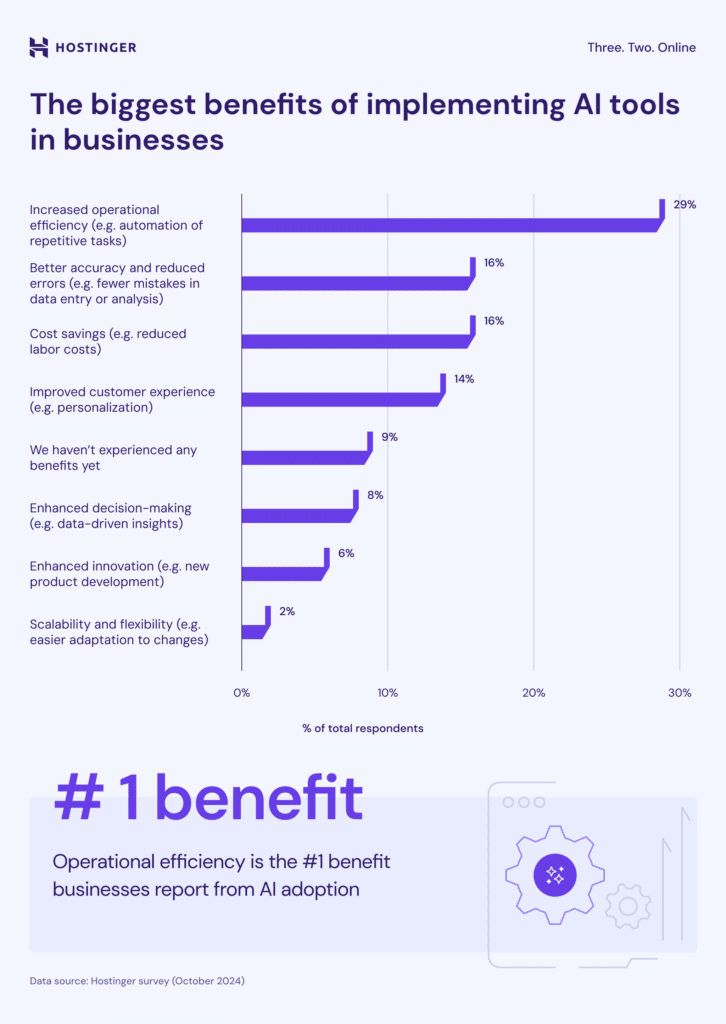
Addressing Modern Business Challenges: Efficiency, Agility, and Customer Expectations
Modern businesses face a trifecta of challenges: the constant pressure to increase efficiency, the need for rapid adaptation (agility), and ever-rising customer expectations. AI and business solutions directly address these pain points:
- Enhanced Efficiency: AI automates repetitive, time-consuming tasks, freeing up human employees to focus on more strategic, creative, and value-added activities. This includes everything from data entry and report generation to customer service interactions. By 2025, it’s projected that 34% of all business-related tasks are performed by machines (World Economic Forum), showcasing the significant shift towards AI-driven operational gains.
- Increased Agility: AI-powered analytics provide real-time insights, allowing businesses to react swiftly to market changes, customer feedback, and unforeseen disruptions. This proactive approach fosters organizational agility, crucial in volatile markets. Indeed, companies that fail to integrate AI risk losing relevance and competitiveness by 2025.
- Elevated Customer Expectations: Today’s customers expect personalized experiences, instant support, and seamless interactions. AI-driven chatbots, recommendation engines, and predictive analytics enable businesses to meet and exceed these expectations, fostering loyalty and driving satisfaction.
AI as a Driver of Digital Transformation
Digital transformation isn’t just about adopting new technologies; it’s about fundamentally rethinking business processes and culture. AI acts as a primary catalyst for this transformation. By integrating AI across various departments-from marketing and sales to operations and HR-businesses can create a more interconnected, data-driven, and intelligent ecosystem.
Transform your ideas into reality with our services. Get started today!
Our team will contact you within 24 hours.
Core Benefits of Using AI in Business
The practical advantages of using AI in business are tangible and far-reaching. Beyond the strategic imperatives, AI delivers concrete benefits that directly impact the bottom line and operational excellence.
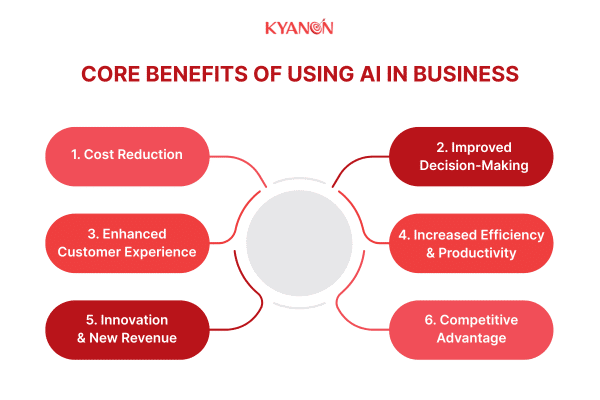
- Cost Reduction: One of the most immediate benefits of AI is its ability to significantly reduce operational costs. Automation of tasks that traditionally required manual labor, such as data processing, customer support, and administrative functions, translates directly into savings. For instance, a 2025 report by Gartner estimates that AI-driven automation could cut operational costs by an average of 30% for enterprises that fully embrace it.
- Improved Decision-Making: AI provides businesses with unparalleled data analysis capabilities. Machine learning algorithms can process vast amounts of structured and unstructured data, identify complex patterns, and generate predictive insights. This empowers leaders to make more informed, data-driven decisions, reducing risks and maximizing opportunities. From predicting market shifts to optimizing pricing strategies, AI offers a clearer view of the future.
- Enhanced Customer Experience: AI personalizes the customer journey like never before. Recommendation engines suggest products based on past behavior, AI-powered chatbots offer instant 24/7 support, and predictive analytics anticipate customer needs. This leads to higher satisfaction rates, increased customer loyalty, and improved brand perception. Imagine a customer service system that resolves issues faster than ever before, simply because AI helps agents pinpoint the problem immediately.
- Increased Efficiency and Productivity: By automating repetitive and time-consuming tasks, AI frees up human employees to focus on higher-value activities that require creativity, critical thinking, and empathy. This boosts overall productivity across departments. For example, AI-driven tools can automate lead qualification for sales teams or streamline document processing for HR, allowing staff to concentrate on more strategic engagements.
- Innovation and New Revenue Streams: AI isn’t just about optimizing existing processes; it’s about enabling entirely new possibilities. AI can drive product innovation by simulating designs, predicting performance, and even generating new creative content. Furthermore, businesses can create entirely new AI-powered services or products, opening up novel revenue streams that were previously unimaginable. Think of personalized medicine or hyper-targeted advertising as examples.
- Competitive Advantage: Ultimately, embracing AI provides a significant competitive edge. Businesses that leverage AI effectively can outmaneuver rivals by operating more efficiently, understanding their customers better, innovating faster, and adapting more rapidly to market changes. In a world where data is the new oil, AI is the refinery that turns raw data into actionable insights and strategic advantage.
Key Use Cases and Examples of AI in Business
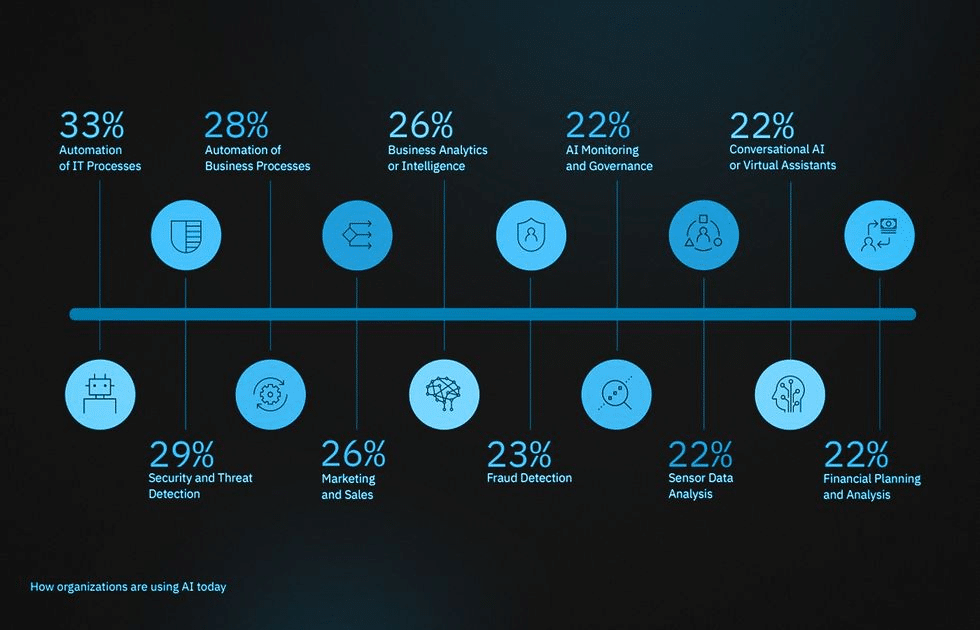
The practical applications of artificial intelligence in business examples are diverse and span virtually every function. Here’s a look at some of the most impactful use cases:
Use cases of AI in Customer Service and Support:
- AI-powered Chatbots: These intelligent bots can handle a vast array of customer inquiries, from basic FAQs to complex troubleshooting, 24/7. They provide instant responses, reduce wait times, and free up human agents for more complex issues. Companies like banking institutions and e-commerce sites widely use them to manage high volumes of customer interactions.
- Virtual Assistants: Beyond basic chatbots, virtual assistants can offer personalized support, guide customers through processes, and even conduct transactions.
- Sentiment Analysis: AI can analyze customer feedback (from calls, emails, social media) to gauge sentiment and identify emerging issues, allowing businesses to respond proactively and improve satisfaction. (Databricks)
Use cases of AI in Sales and Marketing:
- Personalized Recommendations: E-commerce giants like Amazon and Netflix famously use AI to recommend products or content based on user preferences and past behavior, driving engagement and sales.
- Predictive Analytics for Sales: AI models can predict which leads are most likely to convert, helping sales teams prioritize their efforts. They can also forecast sales trends and optimize pricing strategies.
- Automated Marketing Campaigns: AI can segment audiences, personalize email content, and optimize ad placements in real-time, maximizing campaign effectiveness and ROI.
Use cases of AI in Operations and Supply Chain Management:
- Predictive Maintenance: AI analyzes data from machinery and equipment to predict potential failures, allowing for proactive maintenance and minimizing costly downtime. This is crucial in manufacturing and logistics.
- Supply Chain Optimization: AI can optimize logistics routes, manage inventory levels, and predict demand fluctuations, leading to reduced costs and improved delivery times. For example, a major retail chain in 2024 reported a 10% reduction in logistics costs by using AI to optimize their delivery routes.
- Quality Control: In manufacturing, AI-powered computer vision systems can inspect products for defects with far greater accuracy and speed than human eyes.
Use cases of AI in Finance and Accounting:
- Fraud Detection: AI algorithms can analyze transaction patterns in real-time to identify and flag suspicious activities, significantly reducing financial fraud.
- Risk Assessment: Banks and financial institutions use AI to assess credit risk for loans, analyze market volatility, and make investment decisions.
- Automated Reconciliation: AI can automate the reconciliation of financial statements and transactions, reducing manual effort and errors. (IBM)
Use cases of AI in Human Resources:
- Automated Recruitment: AI can screen resumes, identify qualified candidates, and even conduct initial interviews, streamlining the hiring process.
- Employee Engagement and Retention: AI can analyze employee feedback and performance data to identify factors impacting morale and predict potential attrition, allowing HR to intervene proactively.
- Personalized Training: AI can tailor training programs and learning paths based on individual employee needs and career goals.
Use cases of AI in Healthcare:
- Drug Discovery: AI accelerates the drug discovery process by analyzing vast chemical libraries and predicting molecular interactions.
- Diagnostic Tools: AI-powered image recognition helps doctors detect diseases like cancer or retinopathy earlier and more accurately.
- Personalized Treatment Plans: AI can analyze patient data to recommend customized treatment plans and predict patient responses to therapies.
What Industries Benefit Most from AI Automation?
While AI automation offers advantages across the board, certain industries are experiencing truly transformative impacts due to their data-intensive nature, repetitive processes, or direct customer interactions.
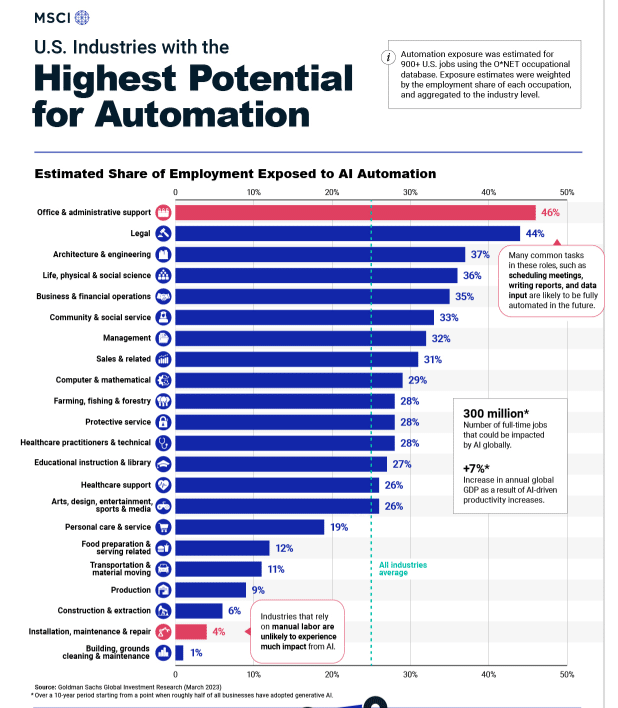
- Manufacturing: This sector is a prime candidate for AI automation, especially in areas like quality control (AI vision systems for defect detection), predictive maintenance (reducing costly downtime), and supply chain optimization (streamlining production and logistics). Companies are using AI to build “smart factories” that are more efficient and adaptable.
- Retail and E-commerce: AI is revolutionizing how we shop. From personalized product recommendations and dynamic pricing to inventory management and customer service chatbots, AI drives higher sales, improves customer satisfaction, and optimizes operations in the competitive retail landscape.
- Financial Services: Banks, investment firms, and insurance companies heavily rely on AI for fraud detection, risk assessment, algorithmic trading, customer support, and personalized financial advice. The ability of AI to analyze massive datasets quickly makes it indispensable for managing financial transactions and predicting market trends.
- Healthcare and Pharmaceuticals: This industry benefits immensely from AI in drug discovery (accelerating research), diagnostics (AI-powered image analysis for disease detection), personalized medicine (tailoring treatments to individual patients), and administrative automation. The goal is to improve patient outcomes and reduce healthcare costs.
- Telecommunications: AI helps telcos manage vast networks, predict customer churn, optimize pricing plans, and deliver highly personalized customer service through intelligent virtual assistants. It’s crucial for maintaining competitive edge in a rapidly evolving market.
- Transportation and Logistics: AI powers route optimization, predictive maintenance for vehicles, demand forecasting for shipping, and even autonomous vehicles. It leads to more efficient deliveries, reduced fuel costs, and improved safety.
- Marketing and Advertising: AI enables hyper-personalization in advertising campaigns, optimizes ad spend, analyzes customer behavior for targeted messaging, and automates content creation, delivering higher ROI for marketing efforts.
- Customer Service: As highlighted earlier, virtually all industries with significant customer interaction benefit from AI-powered chatbots, virtual assistants, and sentiment analysis tools, leading to faster resolutions, 24/7 support, and improved satisfaction.
These industries, often characterized by large volumes of data, complex decision-making, and a need for high efficiency, find AI automation to be a critical enabler of their future growth and operational excellence.
How to Start Using AI in Your Business
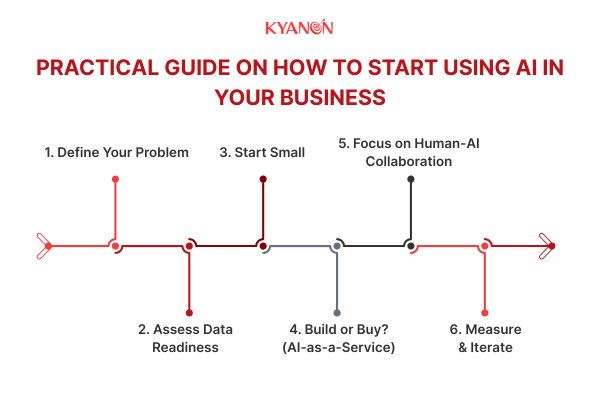
Embarking on your AI journey might seem daunting, but with a structured approach, it’s entirely achievable. Here’s a practical guide on how to start using AI in your business:
Step 1: Define Your Business Problem (Not Just the Technology):
- Before jumping into AI tools, identify a specific business challenge or opportunity you want to address. Is it reducing customer service costs? Improving lead conversion? Optimizing inventory? Clearly defining the problem ensures your AI efforts are focused and deliver measurable results. Avoid implementing AI for AI’s sake.
- Deep Insight: Many businesses fail because they invest in AI without a clear problem statement. Start small, identify a single pain point, and build from there.
Step 2: Assess Your Data Readiness:
- AI thrives on data. Evaluate the quality, volume, and accessibility of your existing data. Do you have clean, structured data relevant to your chosen problem? If not, focus on data collection, cleansing, and integration first. Garbage in, garbage out applies strongly to AI.
- Deep Insight: Data governance and data pipelines are foundational. Without reliable data, even the most advanced AI models will underperform. Invest in data infrastructure early.
Step 3: Start Small with Pilot Projects:
- Don’t try to transform your entire business overnight. Begin with a small, manageable pilot project that can demonstrate tangible value quickly. This could be an AI chatbot for a specific FAQ section, a simple recommendation engine, or an automated data entry process.
- Example: A small e-commerce business might start by implementing an AI tool to identify top-selling products for personalized email campaigns, rather than overhauling their entire customer service system.
Step 4: Build or Buy? Consider AI-as-a-Service:
- Build: Developing custom AI solutions requires significant in-house expertise, time, and resources (data scientists, ML engineers). This is suitable for businesses with unique, highly specialized needs and a strong R&D budget.
- Buy/Partner (AI-as-a-Service): For most businesses, especially SMEs, leveraging existing AI-as-a-Service (AIaaS) platforms or partnering with specialized AI development firms is a more practical and cost-effective approach. These services offer pre-built models, infrastructure, and expertise, allowing you to deploy AI capabilities much faster without the heavy upfront investment.
- Deep Insight: The AIaaS market is booming, with solutions for almost every business function. Don’t reinvent the wheel if a robust, off-the-shelf or customizable service exists.
Step 5: Focus on Collaboration Between Humans and AI:
- AI is a powerful tool, not a replacement for human intelligence. Design AI implementations to augment human capabilities, not to fully automate jobs. For instance, AI can handle routine customer inquiries, allowing human agents to focus on complex, emotionally sensitive cases.
- Deep Insight: Successful AI adoption often involves reskilling and upskilling your workforce. Prepare your employees for the shift and emphasize how AI will make their jobs more strategic and less mundane.
Step 6: Measure and Iterate:
- Once your pilot project is live, establish clear metrics to measure its success. Is it saving money? Improving customer satisfaction? Increasing efficiency? Continuously collect feedback, analyze performance, and iterate on your AI models and strategies. AI development is an ongoing process of refinement.
- Deep Insight: AI models degrade over time as data patterns change. Regular monitoring, retraining, and optimization are critical for long-term performance.
By following these steps, businesses can strategically integrate AI, unlock its immense potential, and drive sustainable growth in the new era of intelligent operations.
Kyanon Digital: Your AI-as-a-Service Partner
In the rapidly evolving landscape of artificial intelligence, choosing the right partner can make all the difference. At Kyanon Digital, we understand that unlocking the true potential of AI in your business requires more than just off-the-shelf solutions. It demands expertise in selecting, developing, training, and continuously optimizing AI models to deliver seamless performance and long-term value. This is why we offer comprehensive AI-as-a-Service (AIaaS), making advanced AI capabilities accessible and impactful for businesses of all sizes.

As a trusted leader in AI development, Kyanon Digital delivers tailor-made AI solutions that directly address your unique business challenges and opportunities. From intelligent chatbots and data extraction tools to advanced business automation systems, our offerings are designed to integrate seamlessly into your operations, driving efficiency and innovation. Our expertise extends to AI model selection, development, training, and ongoing optimization, ensuring seamless performance and long-term value.
What makes Kyanon Digital different?
- Human-Centric Design: We don’t just build technology; we design solutions that are intuitive, impactful, and crafted to solve real-world challenges while enhancing user experiences. Our approach ensures that AI works for people, not just alongside them.
- Engineering Excellence: With our Center of Excellence (CoE) driving innovation, we are committed to delivering scalable, reliable, and future-ready digital solutions. We leverage the latest methodologies and best practices to ensure your AI investments stand the test of time.
- High-Performance Agile Teams: Our expert teams seamlessly integrate with yours, combining deep technical expertise, agile mastery, and transparent collaboration. This partnership approach ensures adaptable, high-impact results, making your AI journey smooth and successful.
Are you ready to transform your business with AI? Whether you’re looking to enhance customer service, optimize operations, or discover new revenue streams, Kyanon Digital is your dedicated partner in harnessing the power of artificial intelligence through our flexible AI-as-a-Service model. Let’s build the future together.
References
- How many companies use AI in 2025? Key statistics and industry trends, Hostinger
- Artificial Intelligence Market Size, Share & Trends Analysis Report By Solution, By Technology (Deep Learning, Machine Learning, NLP, Machine Vision, Generative AI), By Function, By End-Use, By Region, And Segment Forecasts, 2025 – 2030, GrandviewResearch
- AI statistics and trends: New research for 2025, Hostinger
- 32 Essential AI Statistics You Need to Know in 2025, The Social Shepherd
- The role of AI in business: Insights and challenges for 2025, Hostinger
- The Future of Jobs Report 2023, World Economic Forum
- AI Use Cases in Major Industries: Elevate Your Business with Disruptive Technology, Source
- Unlocking the Power of Customer Feedback Analysis in Retail with Databricks AI Functions, Databricks
- AI fraud detection in banking, IBM
- Ranking Industries by Their Potential for AI Automation, MSCI

